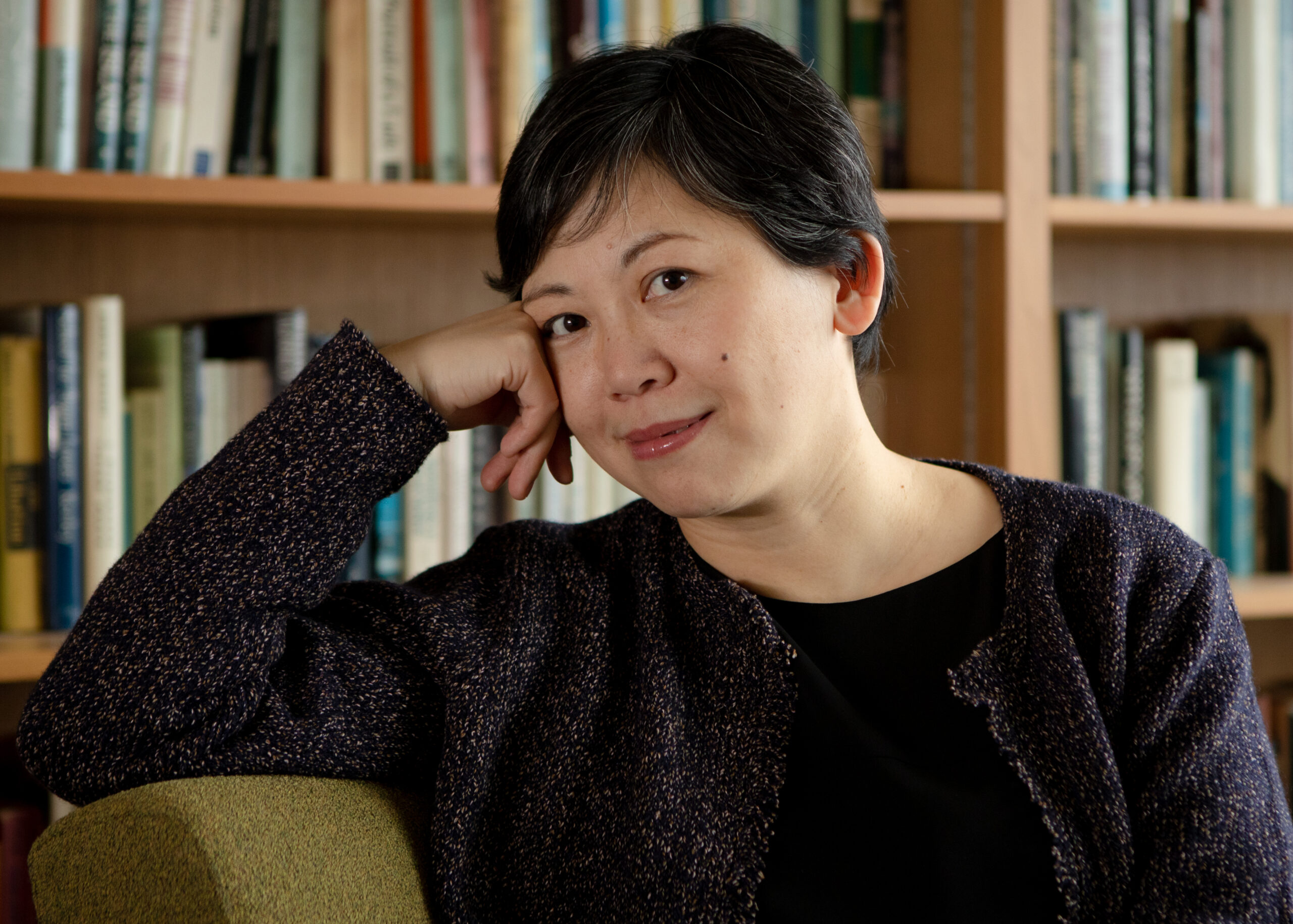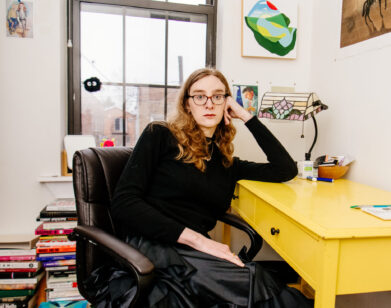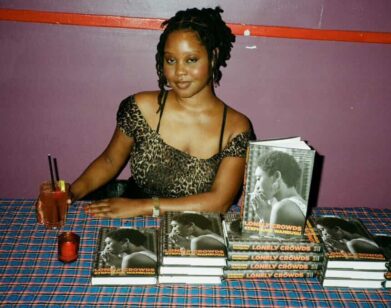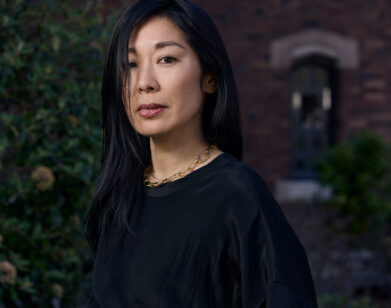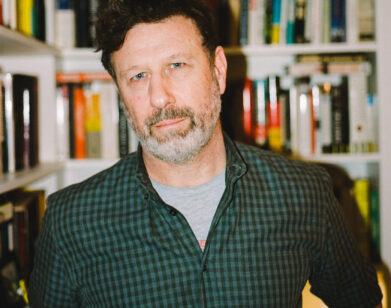LIT
Yiyun Li on Comic Books, First Drafts, and Writing Children
Yiyun Li tells me she loves to cut. Like a kindly doctor with a nervous patient, or an assassin, she sets the reader at ease with the gentle manner of her deceptively simple prose, then jabs them in the arm, or the gut, mercifully, with sharp, poignant needles of beautiful, raw humanity. The magic of the depths she can reach with such brevity is perhaps a trick of her editorial instinct, to cut away from the prose until the reader recognizes the absence on the page as something that’s alive within itself. In her latest story collection, Wednesday’s Child, Li draws pictures of lives suspended in various stages of grief, mourning, and loss, but, because this is the nature of loss, her characters are often contending with something palpable and tangible that exists off the page, lost to the void.
We spoke recently on zoom, between the paperback release of her acclaimed The Book of Goose and the launch of her new collection. Li, seated before her fireplace near Princeton, seemed grounded in the moment as we talked about editing, journaling, the dignity of children in literature, and her unlikely choice for the best American novel.
———
STEPHEN BELL: Yiyun, It’s so nice to see you.
YIYUN LI: I guess we never see each other in the real world.
BELL: Yeah, this is the closest we’ve gotten. It’s just static images and strange puns on Instagram.
LI: That’s what I do. Well, thank you so much for doing this.
BELL: Oh, thank you. You have Wednesday’s Child coming out next month. So, congratulations.
LI: Thank you.
BELL: I know that you were working on this collection for 14 years, I think.
LI: Right.
BELL: Do you think about pacing at all when you are writing or releasing work or does it just happen organically?
LI: This just happened. I think the story collection was overdue. In 2015, there was a collection ready. And, somehow, just one book after another, we never got to publish that collection. We actually cut a lot of stories, and some of them were written for The New York Times, or they’re shorter stories, so we didn’t include them. So, I feel good, only because the collection doesn’t feel rewritten, it feels more accumulated.
BELL: I am glad that you said that it feels accumulated, rather than written, because it didn’t feel like you had a prescriptive moment or anything. It was just happening. And I was curious, was structuring this collection different from your others, because I did enter this book with a sense of the rhythm. And then, you threw this chunky story right in the middle. How did that happen?
LI: Right in the middle. I call it “the novella in three parts.” It feels like life to me. In a way, I think these stories are a little different from my earlier stories. When you’re a young writer, you’re trying to get the craft down, and you’re trying to get the transition, pacing, all those things. And I feel like these stories are written to think through things, rather than to make things happen. And then, the novella was a fluke in a way. I couldn’t contain the story in one story. And I realized, these are two older women, they’re at the end of their lives. They have a lot of history. And, somehow their history is coming in. So I wrote three stories all belonging to the same group, or the same big story. I’d thought that I was going to keep that for another book, maybe write four triplets of stories, so it would be 12 stories, 4 novellas. But then, when we were putting things together, I thought that really fit as a centerpiece.
BELL: These three characters reminded me a lot of what I was working through with The Book of Goose. You deal with childhood in a way that I think a lot of literature doesn’t. These children are analytical. And, I wouldn’t say that they’re cold, but they’re logical. You’re taking away that sense of wonder that we have around children, which I always found strange. I live a life unmarred by children.
LI: Lucky you.
BELL: I don’t really always know what it’s like to write them. I always feel like I have to borrow people’s children to write about them. But the children in your work feel like people I know.
LI: I do think literature abuses children a little. They prove them dumb, right? Cute animals, or sad animals. Sometimes, they’re traumatized animals. I don’t know about you, when I was a child, I never thought I was a child, that I was cute or small. I was just a human being. I had very complex feelings and thoughts. Nobody wanted to hear me. Children are innately very logical, sensible human beings. I think they have the disadvantage of being small. And they also have the disadvantage of not being able to articulate everything. So I really like your comment about how these children, these characters, have their dignity. We need to treat them as real human beings, just in a small format. So, in that sense, I think, Ida’s childhood was full of thoughts about how to not get pregnant. And, in a way, I think her grandchildren, growing up in America, they’re almost becoming cliched child characters, right? Soft-hearted, warm with tears for a spider and pig. But, it’s almost as though these children, if you bring them up in a certain culture, you are framing them as less interesting people, I think. I want to go back to the opening story, the title story, when that girl complained, she said, “Adults are really bad. They treat children like poodles.” And then, she said, “Not even standard poodles, miniature poodles.” I do think children have a lot of thoughts and protests. I have known children for a long time. They do have a lot of sensible things to say.
BELL: Yeah, and I loved that story, and the way that this child was teaching her mother how to engage with her. I feel like a lot of your characters journal.
LI: Oh, do they? They do.
BELL: Do you journal?
LI: Not regularly. I do sometimes.
BELL: Your stories deal with the pandemic almost in the present tense, like it’s happening to them. I found that I had a block, until recently, around talking about the early pandemic. And talking to other writers, I’ve found that people have been having a hard time trying to figure out how exactly to incorporate pandemic writing into regular fiction. And I was curious about your approach to it. Did you find yourself writing about these things organically? Or did you make the choice to incorporate these present day traumas?
LI: Right. I do think, because these stories were written, there was always a thought or a word that sparked my desire or urge to write stories. And these stories were written at that time. I find that the longer you write, the more life bleeds into fiction. I don’t think I’m an autobiographical fiction writer. I don’t like to write autobiographically, it’s just the border between life and fiction becomes a little bit more permeable. So, things go both ways. I find it funny when you said you’re jealous of the characters keeping a journal. Sometimes, they do a better job keeping a journal than I do. And I just thought, “Maybe I should learn from them.” So there is this back and forth between fiction and life. And I think that is more easily done in short stories than, say, a novel in France set in the 1950s. Stories are a little bit more forgiving in that way.
BELL: There was something else in Wednesday’s Child that really struck me. Rosalie is talking about her relationship with Marcy. And there’s this quote: “She wished that nature had installed a different system for people to choose their genealogy, not by their parents, grandparents, and great-grandparents, but by the books they read.” And I was just wondering, what would your genealogy of books be?
LI: That’s a great question. Books really are part of our genes, I feel, despite the fact that books are books. So my genealogy would be rational novels from very early on. And Irish novels: William Trevor, John McGahern, and Lisa Baldwin, particularly those three. Certainly, when I was younger, I read a lot of Chinese novels. But, when I started to write in English, I read a lot of American novelists. But sometimes, you also read a book that you think is important at the time and then you tend to outgrow them.
BELL: I remember reading that you considered English your “private language,” which makes me laugh only because you publish in English so much. So it’s an interesting place to take refuge. But, I also read that you recently had agreed to have some of your work translated into Chinese. Does that change your relationship to what you’re writing moving forward?
LI: That’s such a good question. I haven’t seen the Chinese translation, so I don’t know yet. I’m holding my breath. Partly, it’s going to be a learning experience for me. I’ve been so used to hiding in English in a way, and nobody in China could read my work unless they read the English. Now, I think, I have to do that switch. It’s all about how you trick yourself. I mean, after so many years of writing, China has not changed much. So the readership has remained the same, whether I write in Chinese or in English, or whether I translate into Chinese or not. But I have changed. Allowing my work to be in Chinese feels like a mature decision, and my past decision of not having them translated also felt like a necessary decision.
BELL: Another thing that I’ve been really excited about with your last two books, The Book of Goose and Wednesday’s Child, is the cover design. These two covers, they are wild. They’re the covers where, if I’m at the gym or at the airport, people will stop and ask me, “What is that book?” And that doesn’t happen that often anymore. But FSG always seems to deliver. And I was just wondering how involved you were in the process, and what insights do you think that Na Kim is bringing to your work?
LI: Kim is a genius, I think. She is undoubtedly a genius. I’m not a visual person. But I am fairly certain both covers were first drafts. She got it right away, I think. And when I saw them, I knew. I don’t know her process, but I find her imagination so fascinating.At one time, she did say she went to the museum to see paintings, and the backdrops of both cover’s backdrops have a little bit of classic pastoral painting. I just got really lucky with her.
BELL: Do you prefer your U.S. covers to your UK covers for these?
LI: Okay, let me just speak with grace. I think the U.S. covers and the UK covers, when you put them together, you know they’re the same book. They’re different approaches to the same book. So I really like that. And they do sit nicely together. One is a little edgier, the other one is elegant, right? But I like having two different designs just sit together, and you feel that they’re the same book.
BELL: I am having a hard time wrapping my head around your statement that you’re not a very visual person.
LI: Oh, really?
BELL: I mean, your work, it’s super interior, and you don’t really give us a lot of visual imagery, but there’s such sharpness that I feel like it invites the reader to just picture something that’s already inside of them, if that makes sense.
LI: Right.
BELL: And one of the stories, “On the Street Where You Live,” features art pretty heavily. So how did you find yourself writing about a character who was at an art gallery?
LI: Oh, yes. It’s interesting, because I did make that comment to Na, too. But she said, “You gave me all the colors I need.” With a lot of characters, when you write from within, you only see something when they really see something. For instance, in the title story, “Wednesday’s Child,” when that child was making the afternoon snack and she had three different colors of melon balls. There are moments, I think, when images stand out for characters. And then I catch them. But really, you cannot ask me, “Does Rosalie have long hair or short hair?” I don’t know.
BELL: I argue with my husband about that all the time. When he reads my characters, he wants to know exactly what they look like. And I’m just like, “I don’t think about that.”
LI: Exactly. We don’t think about those things. We think about how it feels, right? I think it’s always how it feels to be that character, rather than how it looks to be that character.
BELL: I guess that means neither of us will find ourselves screenwriting anytime soon.
LI: Oh, no. I’m very bad.
BELL: I saw that you had thanked Deborah Treisman in the acknowledgements. I know that you’ve worked together a lot at the New Yorker. Could you describe your relationship a little bit?
LI: Deborah is one of them, but I mainly work with Cressida Leyshon, who I thanked at the beginning. When you work with a talented editor for a long time, you get to know each other’s style, and then everything becomes a shortcut. Sometimes, Cressida would say, “Oh, I think we need something.” She won’t articulate what that something is. I think her talent is she knows where you just need one more touch to lift the story. We both like cutting, and it’s so very good to work with an editor who can cut. And I like cutting. I like talking about editors, because I don’t think editors are acknowledged enough in publishing. They make a huge difference when they point out things that I don’t see. With The Book of Goose, I worked with Mitzi Angel, who’s my FSG [Farrar, Straus and Giroux] editor. And the first draft was longer, not as tight as the final product. I remember she said to me, “This book wants to be one thing and you want it to be another thing.” I thought, “You cannot indulge your own desire to make the book go a different way.” So I cut 150 pages and the book just became better.
BELL: I have one burning question. What is going on with you and the Peanuts comics, because they are so prominent in your feed, and I love them, because you make me look at Charles Schulz in a way that’s like, “Oh, it’s way more fun than I realized.” And also, it makes me feel a lot less alone in my writing life, because there’s Snoopy with his typewriter.
LI: If there’s one person I wish I could be, it would be Charles Schulz. I also feel like he has written the best American novel, right? The biggest American novel with these characters over the years, and they maintain their consistency, but sometimes they surprise you.With each strip, there is some narrative, but there’s a reputation. It’s always the same setting. But then, things change. I just do that to entertain myself and to entertain whoever has the mind to be entertained. And that’s the reason for all those Snoopys.
BELL: I’m a fan.
LI: Well, thank you.
BELL: This was so much fun.
LI: Thank you, Stephen.

